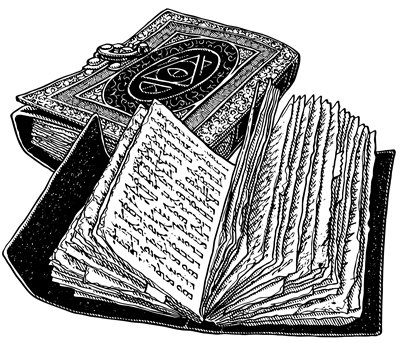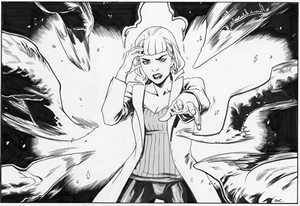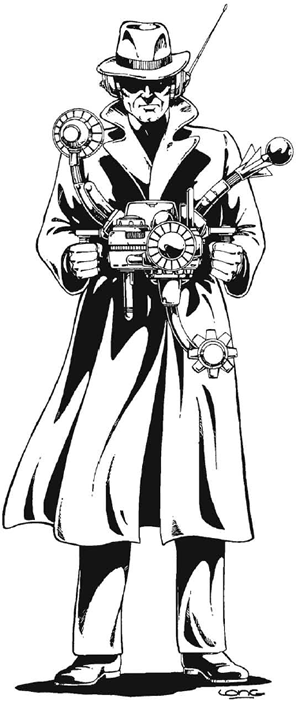“A good character is the best tombstone.
Those who loved you and were helped by you will remember you when forget-me-nots
have withered.
Carve your name on hearts, not on marble.”
– Charles Spurgeon
Character Creation: The Host's Way
Welcome to the Character Creation Room!

This room is dedicated to revealing and explaining the process that I use, and that I encourage all of my players to use to create Beyond the Supernatural RPG characters.
There are a variety of extra steps and options I that include below, as well as house rules and various RIFTER articles and sources from other Palladium titles. I'll point out where to find these sources as I bring them up.
So pull some dice from your bag, sharpen a pencil, print out a character sheet, turn your Beyond the Supernatural 2nd edition book to page 132, and let's light this candle!
The Eight Attributes
.png)
The first step begins exactly as described on page 132. Start with the I.Q. attribute and work your way down. Roll 3D6 to determine each attribute as normal, and be sure to include any bonuses from the P.C.C.
Note: I always suggest you choose the P.C.C. you plan to make before rolling to avoid missing any attribute bonuses, especially if playing a Psychic Savant as they roll their attributes differently than the other classes.
The Host's House Rules:
Low Attributes: Any attribute that's 6 or less may be raised to 7 (excluding the Psychic Savant). Note that those keeping their stats low should see the Attributes Below Average section in RIFTS Ultimate Edition, pages 281-284 as it applies here. I expect this section will one day be added to an upcoming players guide.
Saving Throws: I use saving throws for both Disease and Pain regularly, neither of which are on the canon character sheet (I have a version that does however and you can contact me to get it). The saving throw number needed to save vs Pain and Disease are both 16 or higher. P.E. bonuses are added to Disease while both M.E. and P.E. bonuses are added to Pain.
Weight & Movement for female characters: For those who desire to portray the physical strength of their female character with more “reality”, reduce the maximum carrying and lifting amount by 20% (does not affect any damage bonus). In return that female character gets a +2 bonus to save vs Pain.
High Mental Affinity and Physical Beauty benefits: The Trust and Intimidate: A Way of Life and the Charm and Impress: The Key to Success articles from The Rifter #60 and The Rifter #61 are good articles for players who want to make better use of their character's high M.A. and P.B. stats. In this modern day setting, there are always opportunities to use these attributes and the bonuses gained from them.
Optional Attribute Table from the Dead Reign RPG: On page 160-161 of the DR book, there are optional tables available that are geared towards giving a PC at least one mental or physical advantage in a particular attribute. The options include Brainy, Strong-Willed, Charismatic, Physically Strong, Fast Reflexes and High Dexterity, Great Endurance,
A Beauty or Pretty Boy, and Fast as Lightening.
While I don't have an issue with players choosing to use these tables instead of rolling randomly, I do want to point out that these only give one or two possible above average traits at most. They lack the greater swings of luck that comes from random rolling.
Friendly Attribute Bonus reminder: Don't bother adding up your attribute bonuses until your character sheet is finished. I'll talk about this more below.
Hit Points and S.D.C.
This is performed the same as on pages 135-136. However, I have have a House Rule that if a 1 or 2 is rolled while determining Hit Points or determining S.D.C., you may re-roll those dice once.
If 1’s or 2’s are rolled again you keep them; they're meant to be.
Note: This re-roll house rule is available when rolling 1D6 to add to Hit Points at each new level.
Selecting a P.C.C.
 Same as page 137, but again I encourage players to select their character even before rolling attributes. If you haven't yet, now's the time.
Same as page 137, but again I encourage players to select their character even before rolling attributes. If you haven't yet, now's the time.
Alternative P.C.C.'s and O.C.C.'s: There are plenty of available character types from sources like The Rifter and other Palladium titles to consider, including the following...
The Rifter #1: The Bard P.C.C.,
The Cursed Psychic P.C.C.,
The Priest O.C.C. and
The Pseudo-Psychic P.C.C. Note that these classes are all under 1st edition rules and will need to be reworked between the GM and players to 2nd edition rules.
One day I'd like to update them in a future BTS sourcebook.
The Rifter #13: The Arcane Archaeologist O.C.C., The Occultist O.C.C.,
The Cryptozoologist O.C.C., Living Numbers and The Cursed P.C.C. (The Cursed is for the Nightbane RPG but converts easily as a sort of latent psychic). Note that these classes are all under 1st edition rules and will need to be reworked between the GM and players to 2nd edition rules. One day I'd like to update and add them in a BTS sourcebook (in fact, an updated Cryptozoologist will be coming soon).
The Rifter #19: If you're following the advice of the House, you likely already have this book/PDF for the Go Mental article. Another reason to have a copy is for the Demon Hunter O.C.C. While its designed with NightBane in mind, it can also have a place in your BTS campaign with a little reworking.
The Rifter #53: One of my personal favorites, this issue presents The Lucky Psychic P.C.C., who's specialties include altering not only their own luck, but the luck of those around them.
The Rifter #56: This issue offers up The Tainted Martyr, a P.C.C. who suffers chronic aches, pains and physical debilitations for the ability to transform into a being of incredible strength and ability in the presence of Supernatural Evil.
The Host's House Rules:
If a player truly wants a character class that requires an attribute higher than their PC rolled (example: has less than 10 for I.Q. and wants to play a Parapsychologist), I'll let them raise it to the minimum number required.
If playing a psychic, the player may re-roll 1's & 2's once while determining their I.S.P., even when they roll d4's (like the Fire Walker P.C.C.)
Selecting Psychic Abilities
 Same as per page 139. However I have a house rule that states if the player isn't sure what psychic abilities to select for their new character or hasn't even quite figured out their character yet to know what kind of abilities they would want/use, I allow them to “reserve” open psychic ability spaces and fill them in as they play their new character.
Same as per page 139. However I have a house rule that states if the player isn't sure what psychic abilities to select for their new character or hasn't even quite figured out their character yet to know what kind of abilities they would want/use, I allow them to “reserve” open psychic ability spaces and fill them in as they play their new character.
While there's an argument that this can be considered a form of “min-maxing” a character,
I argue that it helps the players realize what kind of psychic abilities they really want their character to have and will find the most useful.
My limitation to this rule is that all of the open spaces must fill in before the character reaches level 2. Any unused spaces at level 2 are considered to be lost, potential abilities they never could never quite learned to use.
Now, take a deep breath and roll up your sleeves... the next part includes some of the most valuable decisions you'll make for your character.
Occupation and Skills
 This is handled the same as on page 139. However, I'm a big advocate of having a variety of skills to choose from; I see them as one of THE best ways of individualizing and/or specializing your character.
This is handled the same as on page 139. However, I'm a big advocate of having a variety of skills to choose from; I see them as one of THE best ways of individualizing and/or specializing your character.
To that end, this list of Notable Occupations is available, which includes those available in BTS-2 as wells as those found in other Palladium titles.
A note of thanks:
I thank Matt Cutter for compiling this list (and indirectly inspiring me to finally put this room together).
I also have an entire room full of skills in the House that aren't available in the main book; including useful skills from other Palladium titles and various RIFTER sourcebooks. Feel free to select them.
New Anthropologist/Archaeologist and Forensic Scientist occupations available:
One of my favorite BTS resources in the Rifter is the Mundane Doesn't Mean Boring! article found in the Rifter #51. Amongst the variety of details and information are the new Anthropologist (which breaks down into four major fields: Cultural Anthropology, Linguists, Anthropological Biology and Archaeology) and Forensic Scientist occupations.
Also included are several new skills to accompany these occupations and information and advice on how to use them.
The Host's House Rules:
Always starts with one Piloting skill: I'm not a fan of the idea that not all characters get the option of at least one piloting skill as the vast majority of people in a modern day world effectively have to learn some method of self transportation. Even if its bicycling, skateboarding or even driving a moped, virtually everyone has an alternative to walking, or always getting a ride, or taking a bus or an taxi/Uber, etc. to get somewhere.
Piloting skill choices for this house rule include automobile, motorcycle, bicycling and skateboard.
Note that this rule only comes into play if your character's chosen occupation doesn't have at least one piloting skill.
Weapon Proficiency: Expert: Similar to how select skills can attain a professional quality, W.P. skills can be upgraded to Expert at the cost of an additional two skill selections. These skill selections represent the extra time and resources devoted to mastering these particular types of weapons. The payoff to becoming an expert with that weapon type is that it doubles the bonuses earned from that W.P. skill.
Example: Joe selects the weapon proficiency Archery, but decides to become an expert, spending two additional skills to obtain this upgrade. At level 1, Joe get gets a +2 bonus to strike (instead of +1). At Level 2 he gets a +4 to strike (instead of +2), at level 4 he gets a +6 to strike (instead of +3) and so on. His bonus to disarm (and the damage bonus house rule) also doubles.
Note: Needing two actions for a Called Shot or Aimed Shot stays the same, as well as all potential penalties (shooting blind, shooting bursts, shooting at moving targets, etc.)
None of the tricks from Trick Shooting are altered either.
The Law of Diminishing Returns and the Running/Jogging skill: I'm a fan of using both the Diminishing Returns and Running Skill rules from the Go Mental article from the RIFTER #19. I find them to be appropriate for this setting as they not only keep the physical skill junkie's in check, but they encourage the players to select other skills to round out their character.
Hand-to-Hand Combat bonus altering: Once all combat bonuses are tallied, I allow the players to alter the HTH bonuses to fit their character's fight style (or planned fighting style) if desired.
The following combat styles are currently available:
Aggressive: Increase Strike by 1 for each point reduced from both Parry & Dodge.
Defensive: Increase Parry by 1 for each point reduced from both Strike & Dodge.
Evasive: Increase Dodge by 1 for each point reduced from both Strike & Parry.
Note: Add the style note to the HTH Skill (Example: HTH: Expert-Aggressive).
Players can adjust these bonuses multiple times, even when they go up in levels as their bonuses increase (level up, skills, etc), but only via the fighting style they've already selected. Also note that once a style has been selected, the character cannot adjust or revert them back; all changes are permanent.
Use Physical Prowess percentage bonus for Physical Skills: This one might come off as nitpicking, but I've never liked adding the I.Q. percentage bonus to physical skills.
In meta terms, this means that a PC with an I.Q. of 24 and a P.P. of 10 would have a better chance of success at working parallel bars and rings than another player character with a P.P. of 24 and an I.Q. of 10.
While gymnastics training teaches one how to use the bars and rings, its the person's agility, dexterity and physical talent that allows them to excel at it. The same logic applies to all percentage based physical skills.
This meta bothers me as it makes no real sense. I think the canon bonus I.Q. bonus is well meaning and designed to keep things simple, but it bothers me enough that I made a house rule for it.
My house rule: For physical skills 16 or higher, you gain a percentage bonus based on your P.P. attribute, not I.Q. The process is the same in that you use the listed I.Q. bonus amount. Example: A P.P. of 24 would add a 10% bonus to all physical related skills.
Alternatively, I've had a few players grumble about this rule (usually because their player character has a high I.Q. versus a low P.P.). If your players grumble, you can alter this house rule to where they can use either their I.Q. or P.P. bonus, whichever is higher. DO NOT give both.
My Running skill rule: I see eye-to-eye with the Optional Running Skill rule from the GO MENTAL article from the Rifter #19 I referenced earlier. Its too generalized as written and the sport of running has different branches for a reason. An Olympic sprinter obviously differs greatly in practice and ability from a marathon runner. So the Running / Jogging skill is what I use at my table. To get the same amount to SPD bonus as the canon Running skill, the player will also need to take the Sprinting skill.
Swimming note: A high P.S. is not used for bonuses as these skills are about agility & dexterity, not brute strength. There's an argument that a high P.S. bonus could apply to the Swimming skill, but swimming already benefits from P.S. as the swimming speed is determined by it. However, if your players make a strong case for it, feel free to give them the option to use P.S. attribute number as a percentage bonus for the Swimming skill instead of their P.P. or I.Q. attributes.
Boxing note: Similar to how the Aerobic Athletics skill adds +2 to any kick attack, taking the Boxing skill adds +2 damage to any punch attack.
Percentage per Level of Experience Reminder: the % per level doesn't begin until 2nd level (page 173). A.K.A. your Native Language skill, which has a base skill of (88%+1%) means the skill percentage starts at 88% (before any bonuses), not 89%.
Picking an Alignment
This is handled the same as on page 139. For you newer players, I always recommend that you look at the alignments as more a guide than a law. If you're not entirely sure what your new character's alignment should be, Scrupulous is the most common and represents the “basically good person”, which is a good starting point for any player character.
Most characters start out with good intentions.
On the other hand, your GM can always determine that you character's alignment must be lowered accordingly as a consequence for your actions, as well as raise it to a more scrupled alignment as a reward for making an effort and doing good deeds over time.
At present, in the grand scheme of things the alignments don't affect much in BTS.
The vibe far closer resembles the nihilist philosophy of consequences vs rewards for your actions. That being said, certain magic weapons only work with certain alignments and psychic abilities can be affected by a character's alignment, so choose wisely.
Round out the character
 While page 147 states that these are optional rules, I strongly encourage you go through this section. Most of these details can be noted on the upper left area on the back side of the character sheet anyway,
so its an easy thing to do.
While page 147 states that these are optional rules, I strongly encourage you go through this section. Most of these details can be noted on the upper left area on the back side of the character sheet anyway,
so its an easy thing to do.
If you're not sure which one would fit your character best, then I encourage you to just go with the percentage rolls and run with the given descriptions. I've done this a few times in the past as some of my best characters and pregens have come from following the random rolls of this section.
Once all of the above is finished, its now a good time to add up any and all attribute bonuses.
See page 133 for the Attribute Bonus Chart.
Insanity
I strongly encourage everyone to read the designer notes on page 150 to get an idea of what having an insanity means in BTS before you consider giving one to your character. This is an optional game mechanic and I tell all my players that they are NOT required to select an insanity at level one. On the other hand, taking an insanity and truly following through with it and honestly role-playing the results of that insanity not only provides great role-playing opportunities but is worth lots of experience points at my game table. I've also found that insanities work well in a horror game; better than most others in my vast experience.
GM's on the other hand always have the option to place/inflict an insanity upon a character, especially if they just went through a particularly harrowing experience.
I even have a House Rule about this; whenever a Natural 1 is rolled during an attempt to save vs Horror Factor, the character must make an attempt to save vs. insanity.
If failed, the GM can assign an applicable Insanity to the character. Most often this is a related phobia, but a neurosis or affective disorder could also apply. Rules to cure an insanity (see page 157) work as normal.
Final Touches
While there's not a list of weapons & equipment in the main book, there will be one in an upcoming sourcebook (most likely the planned GM & Player's Guide). In the meantime there's a useful list available in the Dead Reign RPG, which I consider to be a required book in the your BTS library; I've had this book in my personal Library since it was first released and its served me well. You can also find equipment, gear and more in said book.
You can also find additional weapons/gear/tech and more worth adding to your characters at the Weapons Locker, the Equipment Storage, and more in the Basement Laboratory.
Finally, I have a few other materials and references that I encourage you to consider using for rounding out your character.
Materials to review and/or download at my writing desk:
Would you like a few more words of advice on rounding out your character sheet?
Well then, make your way to my writing desk in the back of the room there. Yes, I know the floor is slick, but fresh blood is slippery. Just tread carefully and you'll be fine, not like that poor lad on the floor by your feet. Good, you've reached my desk!
Now lift up and look under the typewriter. Do you see those notes? Read those pages for using the Miscellaneous section stats on the back side of the character sheet.
Next, check the side drawer and move aside the sacrificial dagger to find my notes on how to calculate the Miscellaneous Section stats.
Then, under that stack of old parchment papers, you can find my house rule for Hobby Skills, which helps your player characters have “more character”.
I encourage all GM's to read this parchment and consider adding them to their own game.
Lastly, for you range weapon fans, in the notebook bound in human skin... no, not that one, the one under the human skull paperweight (yes, of course its real), you'll find a compilation of various Palladium Books sources that I've put together to be a useful list of Reloading Rules, which includes some my house rules (like longer reloading times) as well as a homemade skill called Tactical Reloading to compensate for the longer loading time. For a more realistic range weapon experience, I recommend using these rules.
Leveling Up
Now that your character is created, you're ready to start playing. As your character goes up in levels, I've got a few house rules at my table that I'll share with you here.
Note: The GM has final say on using any of these house rules.
Ancient W.P. Damage Bonus: Every Ancient W.P. gets a +1 damage bonus with that weapon type at levels 2, 4, 6, 8, 10, 12 & 14. If you've spent the two extra skills to increase an ancient W.P. to Expert level (detailed above), the damage bonus increases by 2 instead.
Save vs. Horror Factor, Perception, and Initiative Bonus: Experience is the best teacher (with perhaps the exception of pain) and the Rifter #7 has an good article about characters receiving Initiative bonuses as they go up in levels of experience.
I agree with this and so I use it. I also include the same experience bonus for Perception and to save vs. Horror Factor. The Rule:
Add +1 to your character’s Initiative, Perception and save vs. Horror Factor at levels 3, 6, 9, 12, and 15.
Learning new skills: Regardless if your character’s occupation gets to select more skills as they go up in levels, every character gets to select either two Secondary skills (gained via learning from other characters, or taking up new interests or hobbies, or just from good old fashioned experience, etc.) or one Elective skill (taking a course, class, continuing occupational education, etc.). If an Elective skill is taken, this skill receives any percentage bonus associated with the occupation for it.
My house rule: The character can select either two Secondary skills or one Elective skill
at levels 3, 6, 9, 12, & 15. See page 173 for the list of skills available in both cases, as well as the characters chosen occupation for any percentage bonuses or skills not normally selectable.
The House of BTS is a fan site and all of it's content is free. However please consider a small donation
as it will help maintain the site and help provide new information, artwork and materials.
As the Host of the House, I thank you for your generosity!

